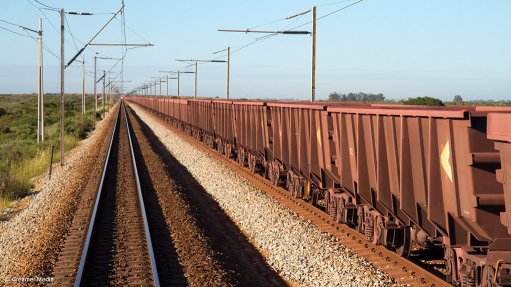
Photo by: Duane Daws
Professional services firm PwC associate director Andrew Shaw has described extensive opportunities for the development of heavy-haul rail networks across Africa, citing the continent’s largely commodity-led growth as the primary driver of the need for improved rail capability and pit-to-port freight solutions.
While acknowledging that commodity demand had softened since pre-2008 levels, Shaw asserted that the market remained suitably robust to justify and support large-scale rail infrastructure in several African States, which had long struggled to “unlock” their geographically isolated mineral resources.
“There are lots of opportunities for [the construction of] heavy-haul rail lines in Africa, where countries continue to tell the story of commodity-led growth. There is also a growing realisation that if rail infrastructure is in place, mining investment will be significantly higher. [A lack of] infrastructure is a retarder of economic growth, “ he commented at the Heavy Haul Rail Africa conference, in Johannesburg, on Wednesday.
The continent had also previously seen the failure of several rail concessions owing to the high volumes of capital investment required for the construction of large-scale heavy-haul rail networks and the accompanying high-risk nature of investment in Africa.
Shaw identified the ten countries with the most growth potential for heavy-haul rail on the continent as Algeria, Egypt, the Democratic Republic of Congo, Nigeria, Ghana, Kenya, Tanzania, Angola, Mozambique and South Africa.
“Each of these sovereigns have a high gross domestic product, strong growth expectations, are rich in natural resources, are a natural exit to landlocked adjoining countries and have high transit traffic volumes. They are also potential
gateways to their respective regions,” he held.
Expanding on Mozambique’s rail infrastructure potential, Shaw said, in terms of trade and logistics, the country represented a “natural” entry point for its landlocked neighbours to the west, but was frequently bypassed owing to the lack of transport networks.
He cited Mozambique as an example of a country whose growth had stalled as a result of inadequate rail infrastructure, despite it boasting “massive” coal reserves, which “couldn’t get out”.
An estimated $20-billion to $25-billion in infrastructure was required to unlock these reserves, Shaw said.
In noting the country’s “significant” need to upgrade and improve the rail network and connected ports to “open up” its coal-rich Tete province, in the north, he emphasised that transport infrastructure investment of some $17-million had been committed to connect mining and agricultural clusters to export ports.